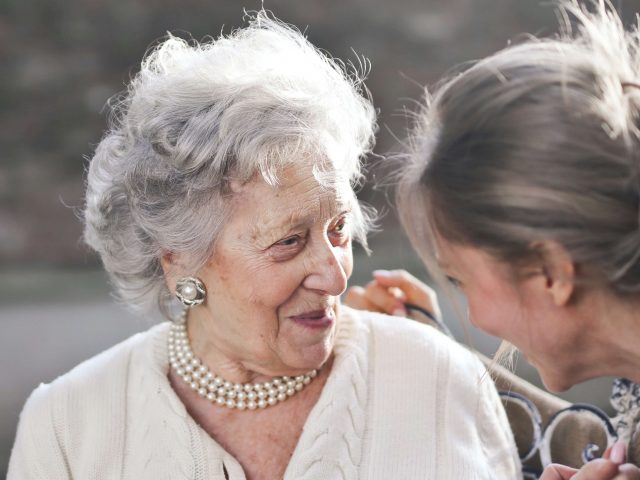Categories
7 Warning Signs That Aging Parents Shouldn’t Live Alone — Without Support
The warning signs that your aging parents need help living alone can range from unexplained weight loss and changes in personal appearance to confusion, forgetfulness, and other qualities associated with memory illnesses like Dementia.
When you’re wondering, “Can my parents still live at home?” you have a lot to consider — including their health, happiness, and unique medical needs. If you decide that your parents need some support continuing to live alone, you have options.
Read our blog on Home Care vs. Nursing Homes.

So, how do you really know if you’re seeing the warning signs of aging parents—or indications of their perfectly healthy yet quirky behavior? Talk to a professional. At By Your Side Home Care, we have over 20 years of experience working in the in-home senior care field. We know the warning signs to look for and the ones to ignore.
Here are some of the warning signs your aging parents shouldn’t live alone—without professional in-home care.
The 7 Warning Signs Mom or Dad Shouldn’t Live Alone
-
- Condition of the Home
If your parents NEVER cared much about cleaning up their clutter, a messy house isn’t much of a red flag. However, if they ran a tight ship for decades before, yet have since given that up, you may need to worry. A messy home can be indicative either of depression or the physical inability to do the chores they did for decades.
Some examples include:
-
-
- Trash piling up
- Spoiled food in the refrigerator or laying about the house
- Spills not being cleaned
- Laundry going neglected
- Dishes piling up in the sink
- Bathrooms becoming filthy
- Trouble Driving or Anxiety around Driving
-
Looking for another sign your parent shouldn’t live alone? See how they drive and how they feel about driving.
If your parent no longer seems to pay attention to and follow the rules of the road, that’s a sign that something could be physically or mentally different. This might be a sign they are becoming a danger behind the wheel.
Furthermore, if your parents seem reluctant to drive, especially when driving was something they loved to do, that can also indicate their health needs a closer look. Anything from eye problems and muscular skeletal issues to memory illnesses can make driving a frightening experience for the elderly.
-
- Weight Loss — Without Explanation
If your mom or dad hits the gym in their senior years – more power to them. That’s impressive, especially in their golden years.
If they lose weight but claim they don’t notice or aren’t dieting, you need to pay close attention. Seemingly innocent, this is a warning sign about your aging parents that you can’t ignore. It can indicate:
-
-
- They may be sick without knowing it
- They may have lost their ability to use the kitchen safely
- Their taste buds may have gotten weaker (it happens to all of us over time)
- They may be forgetting to eat regularly
- They may be clinically depressed and experiencing a reduced appetite
- Neglecting Personal Hygiene
-
A serious sign parents shouldn’t live alone, personal hygiene is something you’ll notice as soon as you see them. In some cases, the cause may be physical, and in others, it may be mental — regardless, it definitely isn’t good. If your parents stop brushing their teeth or showering, that’s one of the most glaring signs they need elder care intervention.
These are the common reasons hygiene gets neglected:
-
-
- They have physical trouble — or feel unsafe — taking a shower
- They forget to take care of themselves every day and don’t realize it
- They are clinically depressed and feel unmotivated
- Clutter on the Floor
-
This is an insider tip. Clutter on the floor might not seem like a big deal to you, but to us, that’s a warning sign your parents need help living at home.
Why is that? Because most people pick things up off the floor as a habit. If your loved ones don’t, it could be an issue of mobility. That doesn’t mean mom or dad’s lives need to change, they just might need some support for a few hours per week.
-
- Struggling to Talk on the Phone
What’s calling your parents on the phone like? If both of you end up getting confused and frustrated, that’s a bad sign.
If your loved one’s hearing or comprehension makes holding normal phone conversations a challenge, you need to talk to them about taking action immediately. If they struggle to understand you, they might also misinterpret information from doctors or other important people. Furthermore, telephone scams that target the elderly still remain dangerously common. Your parent’s confusion on the phone could make him or her easy targets.
Learn more about keeping seniors safe from online scams.
-
- Forgetting to Pay Bills
Again, this sounds somewhat harmless because everyone forgets things from time to time. Think about it again, though. The bills come at basically the same time every month—and your mom and dad have been paying them for decades.
Forgetting multiple bills might not be a series of innocent mistakes but the sign of something bigger.
When most seniors start noticing the signs of a memory illness, they don’t often report it. In fact, they might choose to downplay it. This is a sign that you can often notice on your own just by glancing over their mail with them.
It may mean nothing, but it also might be too serious to ignore.
Even if your loved one is diagnosed with a memory illness, that doesn’t mean they need to give up their home and move into a facility. Our skilled in-home memory care aides keep Alzheimer’s and Dementia patients living safely and happily in their own homes.
Learn more about our Alzheimer’s and Dementia caregivers.

In-Home Senior Care from By Your Side Home Care
For many aging parents, continuing to live on their own is a sign of pride and independence. You want them to be able to age in in their or your home as long as possible.
If you start to notice some of these 7 signs, you can’t ignore them. However, it also doesn’t mean they need to trade the house in to pay for a room in a nursing home.
Our skilled in-home care professionals provide a variety of care levels that allow your parents to keep their home even as they start to need help around the house. Our trusted senior caregivers can provide assistance with everything from making meals, doing chores, and even helping your parents maintain their hygiene.
Want to learn more about what these signs mean — or how we help mom and dad age in place? Start a conversation with us today.



